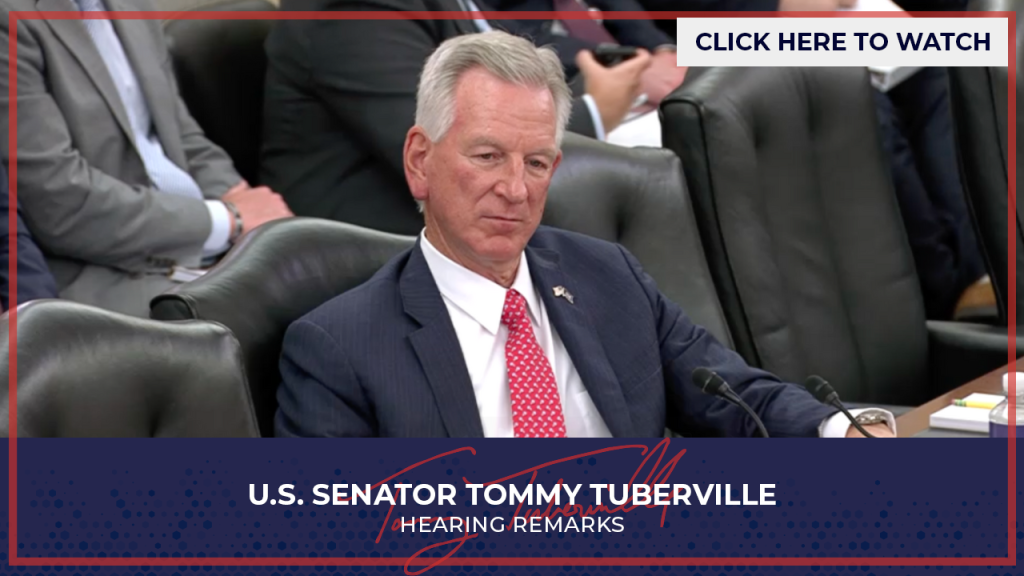WASHINGTON – This week, U.S. Senator Tommy Tuberville (R-AL) spoke with John Bartrum, President Trump’s nominee to be Under Secretary for Health at the U.S. Department of Veterans Affairs (VA), and Jeremiah Workman, President Trump’s nominee to be Assistant Secretary for Training at the U.S. Department of Labor (DOL) during a Senate Committee on Veterans’ Affairs Committee (SVAC) hearing. Sen. Tuberville spoke with the nominees about their plans to improve care for veterans, especially those living in rural areas. Some of the ways discussed included streamlining communication across agencies and expanding Community Care access.
Read Sen. Tuberville’s remarks below or on YouTube or Rumble.

ON IMPROVING COMMUNICATION WITH VETERANS IN RURAL AREAS:
TUBERVILLE: “[Thank you,] Mr. Chairman. Thank you both for being here. I look forward to supporting you both.
Mr. Bartrum, one of the biggest complaints I hear about the VA healthcare services is communication. In my state of Alabama, we are very rural, and it’s a huge problem. If confirmed, how will you work with the Secretary in utilizing the new technology that we have for community service?”
BARTRUM: “Thank you, sir. As you know—we talked a little bit about this when I met with you—rural veterans who live in the rural area are somewhere between 60-66% of our veterans. So, reaching out, and reaching to our veterans, and partnering with not only the VSOs and our service organizations that are out there, but using our technology that we have with our communication strategy, websites, and reaching out to folks with our provider network […] and community care partners is something that I wanna look into and work with you [to] partner on, and look at the strategies. I’m not steeped into what strategies VHA is using since I’m not in the role. But once I’m in the role, I would love to partner with you and bring back what we’re doing specifically and figure out how we can best reach out to our rural networks.”
TUBERVILLE: “Thank you.”
ON PLACING VETERANS IN LONG-TERM, QUALITY JOBS:
TUBERVILLE: “Mr. Workman, in your testimony, you highlighted the need for DOL vets to focus on outcomes and performances. If confirmed, how will you ensure veterans are not just a number, but instead placed in long-term, quality jobs?”
WORKMAN: “Thank you for the question, Senator. I think when it comes to our veterans and when they’re transitioning from that [active veteran status], it is important for us to capture them as they’re leaving the door in what we call the Transition Systems Program (TAP). I believe a lot of folks are falling through the cracks, and for whatever reason, not attending TAP or just not soaking it in. I think that’s where it starts is that last six months to a year before they leave active duty or reserve status. Once out into small, wherever they go in America, that’s generally where we start to see issues. They lose that support network. That’s where our American job centers come into play. We need to make sure that the folks out there are properly trained and doing what they need to do to take care of our transitioning veterans and their family members.”
TUBERVILLE: “Thank you.”
ON INCREASED COMMUNITY CARE:
TUBERVILLE: “Mr. Bartrum, in May, the VA announced the policy change that would make it easier for veterans to access Community Care when a VA doctor determines it is in their best medical interest. What’s your opinion on this announcement?”
BARTRUM: “I thought it was the right announcement, and it should have been done years ago. I believe that when a veteran and their doctor says they need to go to a referral on the outside and they both agree that that is enough to send them to the outside to get preferred.”
TUBERVILLE: “Thank you.
ON IMPROVING COMMUNICATION BETWEEN DOD & VA:
TUBERVILLE: “Mr. Workman, as you know, the federal government is very siloed, and agencies often do not communicate with each other. [It] seems like we can’t get information from the DOD to the VA coordinated, because all the systems are different. It’s been a disaster since I’ve been here. We spent billions of dollars. We can’t seem to do it. But if confirmed, how will you improve coordination across agencies to veterans and put them first?”
WORKMAN: “Thank you for the question, Senator. If confirmed, […] you’re 100% correct—we need to tighten up communications across the different departments and agencies. I feel like sometimes vets, [DOL vets], sometimes do not always have a seat at the table, and if confirmed, I can assure you that we will have a seat at the table with the DOD and also the VA, so it can better serve our veterans and their family members.”
TUBERVILLE: “Are you aware of the problems that we’ve had [about all the information going from DOD to the veterans]?”
WORKMAN: “Yes, Senator. I spent 10-11 years working at the VA. I’ve also worked for DOD in a civilian capacity, and I do know that it is a challenge. Like I said, if confirmed, we will have a seat at the table and we look forward to working with our counterparts.”
TUBERVILLE: “Mr. Bartrum, you and I talked about this—but coinciding information—you cannot get something done unless you get both sides working together. What’s your thoughts on that?”
BARTRUM: “I think we need to re-energize the sharing agreements of data and get data across the system. I also think we have to do a better job of coordinating data [within] VHA and VBA, because that data needs to flow smoother. So, I think there are lots of opportunities to do data sharing within the department and within intergovernmental agencies.”
TUBERVILLE: “Thank you. Thank you, Mr. Chariman.”
Senator Tommy Tuberville represents Alabama in the United States Senate and is a member of the Senate Armed Services, Agriculture, Veterans’ Affairs, HELP and Aging Committees.
###